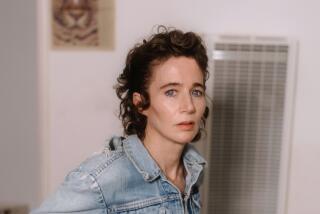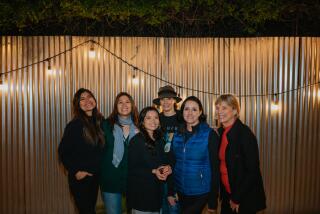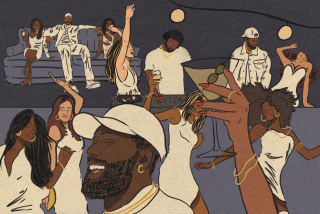NOW’s 20 Years: Measuring the Effect on 2 Lives
- Share via
They are only eight years apart, but life has been quite different for two working women, one who started her career early in the women’s movement and the other who started midway through its first 20 years. Here are their stories.
Had it not been for the women’s movement, attorney Margaret Henry believes, “I probably would have gone to law school--but I don’t think I would have had the encouragement to finish.”
By 1972, her third and last year at Ohio State University school of law, the old standards were changing--with some nudging by the National Organization for Women and other feminists--and, she said, “You didn’t feel you were out there breaking barriers.”
That’s not to say that the nation’s law schools were sexually integrated. “The class ahead of me had three women out of 200,” Henry recalled. “My class started with 13, and eight of us graduated.” (Today, half of all law students are women.)
Became a ‘Libber’
Henry, 39, one of four full partners in the Century City firm of Rosner, Owens, Nunziato & Henry, decided in high school that she wanted to be an attorney. Her friends and family--save for her mother, a “closet feminist” who as a senior citizen did battle for the Equal Rights Amendment--said she’d “never” be one, which, Henry acknowledged, “really set my mind to it.”
But she was not prepared for the chauvinism that was widespread in law schools. Henry remembers frequently being “picked on” by her professors and recalls a male colleague condescendingly asking her and a woman friend, “What brings you girls to law school?” Henry’s friend replied, straight-faced, “We’d like to be legal secretaries.”
The awful part, Henry said, was that “he absolutely believed it.”
When she started law school, she recalled, “I was saying I was not a feminist, or probably in those days ‘a women’s libber.’ By the time I graduated, I was saying, ‘I am a women’s libber.’ ”
When she went looking for her first law job, Henry said, “They were still at the stage of blatantly saying, ‘We don’t hire women.’ ”
A job with the Ohio attorney general’s office while in law school led to an interest in consumer protection and, ultimately, to the staff of former Los Angeles City Attorney Burt Pines, where she stayed six years.
Then she was hired as senior counsel by Torrance-based Toyota Motor Sales, USA. In late 1985, she went into a private practice partnership.
When she first entered private practice, Henry said: “I really wondered about a woman being able to bring in clients. I’m sure there is still an existing prejudice.” But now, she observed, “I have three (corporate) clients who have women as their general counsels. There is the beginning of an old girls’ network.”
A link in that network is the Women Lawyers Assn. of Los Angeles, for which Henry served as president in 1984-85. Its quest for equality has included pushing for legislation that would ban business tax deductions at private clubs that discriminate against women and minorities.
The prejudice women encountered 15 years ago in law schools is still pervasive within the legal profession today, Henry believes, but “people are less open about it.” She still hears male attorneys speak of concerns about “women’s moods and emotions,” commonly claiming that it is their partners and/or their clients who “really wouldn’t want a woman in this job.”
From college on, Henry knew, “I was not going to get married and I was not going to have children. I had always thought a married woman could never do anything on her own again.”
But almost four years ago, Henry married state Board of Equalization member Conway Collis and they are the parents of a 2-year-old, Everett, affectionately dubbed Rocky. Henry admitted, “I had to eat a lot of crow.”
She and Collis met during a 1981 political campaign when Henry was supporting Bob Ronka for city attorney and Collis was managing Ira Reiner’s winning campaign. She describes her husband as an “ardent feminist.”
At 31, ad agency vice president/senior copywriter Linda Young is of a generation whose career paths were cleared by the women’s movement. “To this point,” she acknowledges, “there’s really been nothing standing in my way.”
Young was only 11 years old when NOW was born and, by the time she entered the work world, it was all but a given that women as well as men expected to have careers. “I kind of got in on the beginning of the benefits of the women’s movement,” she said.
With a bachelor’s degree in communications from Ohio University, she set out in 1977 for Cincinnati and her first professional job, as a junior copywriter at an ad agency. When she left three years later, she was a senior copywriter.
She was also married, to Terry Young, who had taken a job after graduation from Ohio University as a reporter for the Cincinnati Post. But this was a modern marriage, so when Linda was recruited by Wells, Rich, Green, then a red-hot Dallas agency, Terry resigned and moved with her to Texas, where he was hired by the Dallas Times-Herald.
‘One of the Fortunate Ones’
Both later switched jobs, Linda going to a competitive Dallas agency and Terry into public relations. In 1984, BBDO-West beckoned Linda and her creative partner, Dabni Harvey. Terry moved West with his wife and Dabni’s boyfriend came, too.
“I know I’m one of the fortunate ones,” Linda Young said. “Advertising is a pretty with-it business,” one that opens its doors to creative women. “But as easy as it’s been for me, I know it’s not that way across the board.”
Although she said she has encountered “no obstacles” during her career climb--save for one superior who made it clear there would be “no little girls working on our account” and one job that went to a male who was her junior at the firm--she is now wondering if there will be limits.
“I kind of think I’ve reached that level,” she said. “I don’t see too many women up there” in what she refers to as “the boys’ club,” the world of creative directors.
And, as the mother of a 3-month-old son, Zachary, she is struggling with some of the problems defined by Betty Friedan when she talks about “Phase 2” of the women’s movement--the stage where women may have adequate jobs but still are lacking support such as child care. Although she has found a competent woman to care for her baby at home in Van Nuys, she acknowledges “a little guilt” over leaving him each day.
She says she knows a lot of young women juggling motherhood and careers and “going nuts.” There has been little change in the prevalent corporate attitude, she pointed out--”Daddy works and Mother takes care of the children.”
Her biggest problem, Young said, is trying to fit everything and everybody into a day that sometimes ends at 9 o’clock when she falls into bed, exhausted.
Even so, she says, “I feel kind of lucky because I get to have a family and I still get to have a career. It seems the give-and-take is worth it.” She and Terry, a feature writer at the Daily News, haven’t decided whether they want a larger family. “One at a time,” she said. “I want to make sure I have enough time to spend with this one.”


